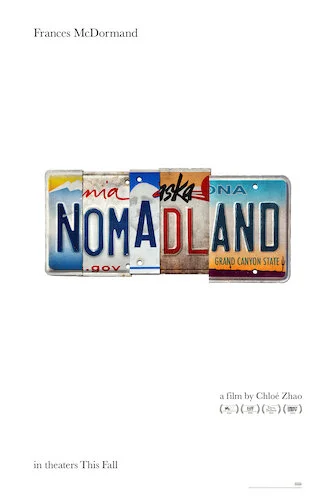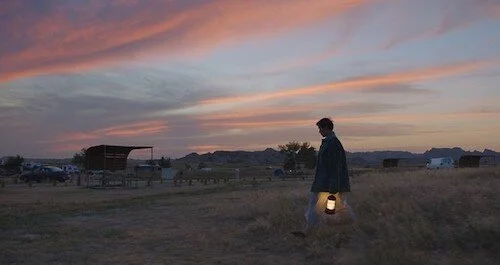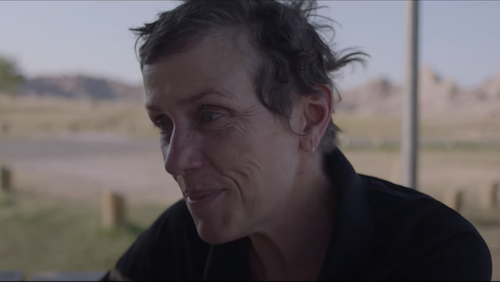Nomadland
Written by Andreas Babiolakis
We are playing catch up by reviewing films that are a part of the current awards season.
Chloé Zhao has been one of the finest storytellers of the vast landscapes of America this past decade; Songs My Brothers Taught Me and The Rider both depict Native American voices through her nurturing indie-film gaze. It only made sense that she would take on one of the most prominent portions of contemporary American history: its recession. Nomadland: Surviving America in the Twenty-First Century was a recount (by Jessica Bruder) of how many older laid-off employees became nomads that traversed the nation to get by. This has been an adaptation project that Frances McDormand championed from the start (she serves as a main producer, as well as the film’s star); all the picture needed was Zhao’s filmmaking grace to glue all of the pieces together.
Zhao also wrote the screenplay, so she understands her own interpretations of Bruder’s story better than anyone else. The pacing of the film proves this, as Nomadland moves both slowly yet rapidly (as if it is made up of very specific memories strung together to tell a story). Each scene says a lot through very little, and no sequence is necessarily bookended with an introduction or closing moment. The first time I finished Nomadland, I knew it was a picture I had to watch again and relive over and over. I’m not insinuating that it’s easy to miss anything the first time through, but knowing specifically what purpose each scene serves certainly will make you want to review each moment with hindsight.
Nomadland’s passive nature means its emotional connection with you is much more organic.
This also means that Nomadland is never in-your-face with its emotional conveyances. I found so much of the film to be naturally sympathetic, as if we were watching life and not a feature film. Frances McDormand — ever the fantastic thespian — always knows exactly what a film requires. She might have stole scenes in works like Fargo or provided supporting oomph in films like Moonrise Kingdom, but in Nomadland, she just exists. Rarely does McDormand (as Fern) perform as though she is on a stage for the world to hear. Fern is trying to digest this new life of hers moment by moment, and McDormand’s patient performance (full of reactions and time to listen to others) is hyper realistic. Again, McDormand’s role here might not be as powerful as some of her iconic work of yesteryear, but this is as thorough as McDormand’s ever been; expect her to be a big name during the Academy Awards this year.
On the topic of Fern, Nomadland is her story through and through. We see the termination of her work at US Gypsum right away (if anything, we start things off with her already having to move on). She immediately becomes a nomad; she sells everything, purchases a van, works at Amazon to continue to get by, and otherwise makes ends meet all across America. As much as Nomadland is Fern’s story, it’s also about all of the people she meets. The film includes actual nomads for authenticity (and McDormand herself lived this nomadic lifestyle in preparation), so the essence of being in these actual situations feels very real. It’s when you realize that Nomadland is beyond the names on the poster; it truly is a story that’s meant to encompass all kinds of American lives, and serves as a podium for the unheard.
Nomadland is full of so much empty space, providing audiences with a chance to get immersed and invested.
Nomadland is that rare kind of film that exists on its own, and all participants serve it. Sure, McDormand stars in the film and helped produce it, but her subtle performance allows the tales of explorers to resonate as much as possible. You’ll always be aware you’re watching a film, but viewing Nomadland feels like a different kind of film; like Zhao has tapped into a new sublime way of telling massive stories. The funny thing is not a single second feels like a documentary (despite all of the realism, and the use of actual nomads); it’s like Zhao was targeting the ways of Italian neorealism more than trying to trick you into thinking you’re watching live footage.
This works in the favour of the film, because Nomadland really does prioritize the many American lives hurt by the recession. You see a number of citizens try to get by in their own way, and some occasionally open up; these moments serve as the emotional focal points of the film, and not one iota feels enforced by cinematic manipulation. Of course, there is still a plot line for Fern (and her own nomadic experiences hit their own speed bumps throughout the film, showcasing Fern as the embodiment of someone dealing with change firsthand), but much of Nomadland is built up by empty spaces: the time with the stories of others, with endless landscapes, the sun’s rays hitting us, and the wind consoling us.
Frances McDormand is stellar as usual in Nomadland.
2020 is a bit of a special year for a film like Nomadland, which may have done well in other years but not quite as well as it can do now. The 2021 awards season is an open opportunity for something as poetically warm and fundamentally sympathetic as Nomadland, and I hope it soars. This is the time for mainstream events to recognize work like this film, and the filmographies of endearing filmmakers like Chloé Zhao. Being quiet doesn’t mean bad, and Nomadland is evidence that, sometimes, the best ways to understand subjects and stories is to just be present and let the connection between the art and the viewer do its thing. Nomadland is a gorgeous, emotional feature film that couldn’t have come at a better time; many potential viewers are hurting once more after the pandemic, and Nomadland identifies the great changes a large portion of us have had to make.
Andreas Babiolakis has a Masters degree in Film and Photography Preservation and Collections Management from Ryerson University, as well as a Bachelors degree in Cinema Studies from York University. His favourite times of year are the Criterion Collection flash sales and the annual Toronto International Film Festival.









